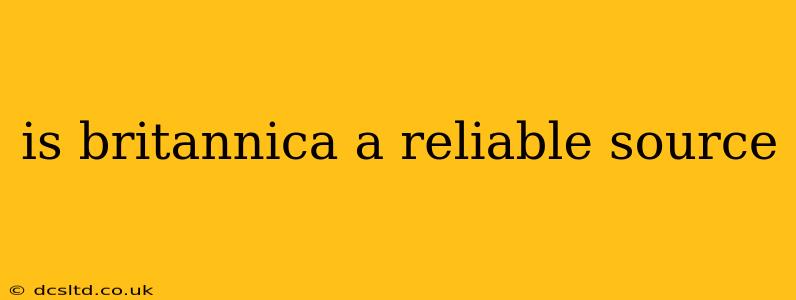Is Britannica a Reliable Source? A Deep Dive into Encyclopedic Authority
Encyclopedias have long served as pillars of knowledge, offering comprehensive overviews of diverse subjects. Among these, Encyclopædia Britannica stands out, boasting a history spanning centuries. But in today's digital age, with information readily available from countless sources, the question arises: Is Britannica a reliable source? The answer, while generally positive, requires a nuanced exploration.
Britannica's reputation for reliability stems from several key factors:
-
Rigorous Fact-Checking and Editorial Oversight: Britannica employs a team of expert editors and fact-checkers who meticulously review and verify every article. This rigorous process, absent from many online sources, significantly enhances the accuracy and trustworthiness of the information presented. They prioritize verifiable information and cite sources, allowing readers to independently corroborate the claims made.
-
Expert Contributors: Britannica articles are typically written by leading scholars, researchers, and subject-matter experts. This ensures a high level of authority and accuracy, surpassing the often less-vetted contributions found on many online platforms. Their expertise lends credibility and depth to the information presented.
-
Continuous Updates and Revisions: Unlike static print encyclopedias, Britannica's online platform is constantly updated, reflecting the ever-changing landscape of knowledge. This ensures that the information remains current and relevant, a crucial aspect in today's rapidly evolving world. They aim to incorporate the most recent findings and perspectives.
However, it's crucial to acknowledge some limitations:
-
Potential for Bias: While striving for neutrality, any encyclopedia, including Britannica, can be susceptible to subtle biases depending on the authors and editorial choices. Critical readers should be aware of this possibility and consider consulting diverse sources for a balanced perspective.
-
Subscription Model: Access to the full content of Britannica requires a subscription, making it less accessible than free online encyclopedias like Wikipedia. This can limit its reach and potentially create an uneven playing field in terms of information access.
-
Length and Depth: While Britannica’s depth is a strength, it can sometimes be overwhelming for readers seeking concise information. The lengthy articles, while comprehensive, may not be suitable for quick fact-finding.
Frequently Asked Questions (FAQ):
Is Britannica better than Wikipedia?
This is a frequently debated topic. Wikipedia's collaborative nature allows for rapid updates and a wide range of perspectives, but it lacks the rigorous fact-checking and editorial control of Britannica. Britannica offers greater accuracy and reliability due to its editorial process, but Wikipedia is more readily accessible and frequently updated. Both have their strengths and weaknesses, and using them in conjunction can often provide a more well-rounded understanding of a topic.
How does Britannica compare to other online encyclopedias?
Compared to other online encyclopedias, Britannica generally stands out due to its rigorous fact-checking, expert contributors, and editorial oversight. Many other online encyclopedias lack the same level of quality control, leading to potentially inaccurate or unreliable information.
Are there any downsides to using Britannica?
The main downside is the subscription cost. Free online encyclopedias are readily accessible to everyone, while Britannica's content is behind a paywall. Another potential downside is the length and depth of some articles, which can be overwhelming for casual readers seeking quick information.
Is Britannica suitable for all ages and educational levels?
While Britannica is a valuable resource for researchers and students, its sophisticated language and in-depth coverage may not be suitable for younger children or those without a strong academic background. Simpler encyclopedias tailored for specific age groups might be more appropriate for some audiences.
Is Britannica's information always completely unbiased?
No encyclopedia can claim complete objectivity. While Britannica strives for neutrality, the selection of authors, editorial decisions, and the inherent perspectives of experts can introduce subtle biases. It's crucial to engage with the information critically and compare it with other sources.
In conclusion, Encyclopædia Britannica remains a highly reliable source of information, distinguished by its rigorous editorial processes and expert contributors. However, its subscription model and potential for subtle bias are important considerations. Using Britannica in conjunction with other credible sources, understanding its strengths and limitations, will ensure a well-informed and nuanced understanding of any topic.
